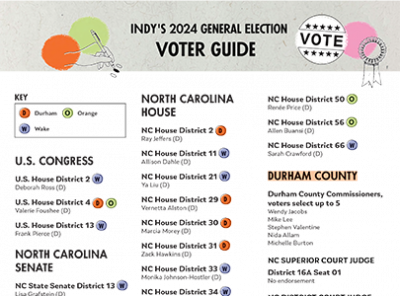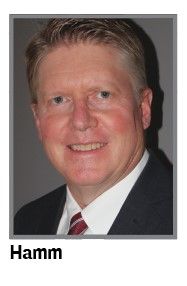To endorse or not to endorse
Teri Saylor
Special to Publishers' Auxiliary
Dec 1, 2024
When the publishers at The Washington Post and the Los Angeles Times announced they would not make endorsements for the 2024 presidential election, the blowback was gale force. It was widely reported that a quarter–million Washington Post readers had cancelled their subscriptions.
These newspapers are just two in a growing list of daily newspapers halting their presidential election endorsements. Many small community newspapers have not made endorsements in decades.
Joshua Benton, reporting for the Nieman Lab on Nov. 4, wrote that roughly three quarters of major American newspapers didn’t endorse anyone for president in the 2024 election. (https://bit.ly/4enLlYE)
“Led by risk-averse corporate owners, dozens of the biggest U.S. newspapers have decided their editorials should express opinions on everything except who should be president,” he wrote.
Using a database of newspaper endorsements from The American Presidency Project at UC Santa Barbara, Benton tracked how many of the nation’s 100 highest-circulation newspapers had declined to endorse for president. The trend line starts in 2004, when nine newspapers did not make a presidential endorsement. By 2012, that number had risen to 23, and by 2020, there were 44 newspapers without a presidential endorsement.
In 2024, Benton counted newspapers by hand to estimate the further decline in endorsements, and he calculated that 22 newspapers endorsed Kamala Harris, two endorsed Donald Trump, and 71 did not endorse anyone. (https://bit.ly/3CsaoMT)
Benjy Hamm, Director of the Institute for Rural Journalism and Community Issues at the University of Kentucky, is not surprised. He has witnessed firsthand the decline of newspaper endorsements for decades.
Before joining the Institute for Rural Journalism in 2023, Hamm held the editorial reins at a variety of newspapers in the South, including a long tenure as editorial director at Landmark Community Newspapers from 2003 until 2017. He went on to serve for a year as editorial page editor at the Virginian Pilot, the former Landmark flagship newspaper, now owned by Tribune Publishing.
“Out of the nearly 70 publications at Landmark's community newspaper division, only a handful endorsed candidates — typically just the daily newspapers,” Hamm said in a recent Zoom call.
“Today, I'm not aware of any statistics about endorsements at the community newspaper level, but I would estimate that more than 95% don't do endorsements of any kind, much less for presidential candidates,” he said.
One practical reason many newspapers have stopped their endorsements is the lack of bandwidth. Historically, editorial boards have been known for conducting extensive candidate interviews in all races, but they take up precious time, and as opinion page staffs have declined, the interview process has become overwhelming, Hamm said.
“At The Pilot, we had to cut down on endorsing some races because we would have had to do more than 100 interviews across our coverage area,” he said. “I always enjoyed doing them, but they just took too much time.”
Landmark’s weekly newspapers were free to decide for themselves whether they would publish endorsements, and in most cases, the weeklies chose not to. They had neither a large staff nor an editorial board, and often the newspapers’ editors were also the editorial page editors, Hamm added.
“So, whoever’s making the decision for endorsing candidates has to be careful if they’re also covering those same elections as well as local government,” he said.
In many cases, the editors at those weekly newspapers considered that people already knew the candidates in their communities through personal interactions with them, and in many cases, grew up with them and knew their families.
“So, the editors in the smaller communities felt there was less of a need to endorse particular candidates for that reason,” Hamm said.
IndyWeek, an urban weekly newspaper in Durham, North Carolina, endorsed candidates in local and district races, but not in the presidential or statewide elections, said editor-in-chief Jane Porter.
“I think the decision to start endorsing in only the local races was put in place after the last midterms, and it's in line with the hyperlocal focus of our newspaper,” she said in a recent phone call.
IndyWeek covers three counties in the Research Triangle Park region of North Carolina — Raleigh, Durham and Chapel Hill, home to N.C. State University, the University of North Carolina and Duke University. It is known as a traditionally progressive newspaper and focuses on news, politics, culture and entertainment. IndyWeek is a digital–first newspaper and prints twice a month.
Porter recalls a large outcry when the newspaper announced the end of national and statewide candidate endorsements.
“People were upset, and I fielded dozens of emails,” she said. “Finally, they got used to our endorsement policy, and we received a positive response this cycle, so I think endorsements are still popular and there’s still a demand for them.”
In making its endorsements, IndyWeek did not conduct candidate interviews but instead relied on its own reporting, review of public records, talking with sources and other traditional newsgathering activities.
Last October, Ned Seaton, publisher of the Mercury in Manhattan, Kansas, published a letter to his readers explaining why his newspaper would not be endorsing candidates in any partisan races.
“We do still provide some guidance for those who are undecided in local non-partisan races , but otherwise, I’ve decided to avoid supporting one candidate over another,” he wrote.
He reasoned that endorsements on the Mercury’s editorial page would not influence readers and voters because most had likely already made up their minds.
“So, whatever I do here is not going to convince anybody — and if the opinion pieces published here persuade anybody, they’ll do so over time, gradually, by exploring issues, rather than a ‘you-should-pick-this-person’ whack over the head,” he wrote.
He also cautioned his readers about blurring the lines between the news reporting and the opinion pages and explained that is counterproductive when the expression of an opinion undermines the credibility of the newspaper’s news coverage.
“The independence and objectivity of the news service we provide is far, far, far more important than any opinions we publish here,” Seaton wrote. “The newspaper exists to provide that news and information; the opinion page exists only to encourage people to think.”
Hamm agrees.
“The perception of bias would be worse than the gain you would have by endorsing a particular candidate, particularly in community newspapers where the same person writing editorials is the person who’s making news decisions or covering city council,” Hamm said. “When I was at The Pilot, the opinion staff were on a completely separate floor from the newsroom, and we didn’t interact as far as news decisions.”
He added that some of Landmark’s community newspapers did have editorial boards that included members of the community, and the benefits were two-fold: serving to keep opinions from appearing like newsroom decisions and educating the community on how editorial decisions are made.
In North Carolina, Porter believes the readers of IndyWeek do know the difference between news and opinion.
“We have a highly educated readership who are civically involved to begin with and have a high degree of media literacy,” she said.
At the same time, she believes a key opportunity for community newspapers to engage their readers and help them understand the role of the free press is to be present in their lives every day — a characteristic of the local media that sets them apart from large national newspapers like The Washington Post.
“I think being out in the community is a good thing — just being seen and making sure that the readers you have now and your future readers or anyone that you want to bring into your fold see you as a fellow resident, and not just someone who is observing from a distance,” she said.
Teri Saylor is a writer in Raleigh, N.C. Contact her at terisaylor@hotmail.com











